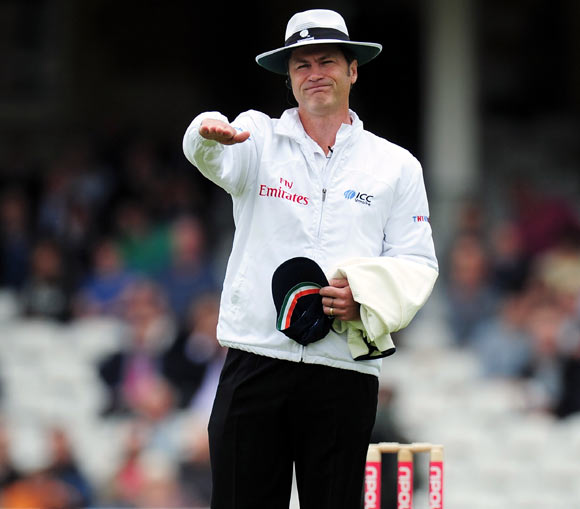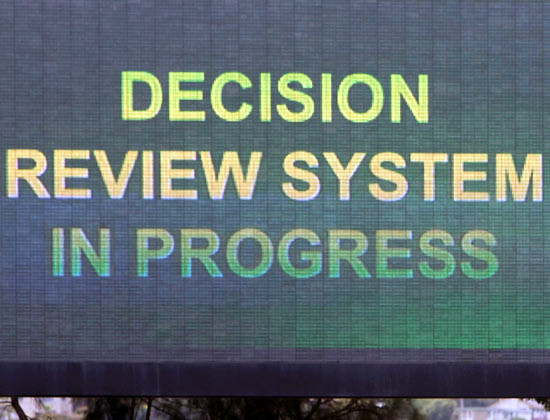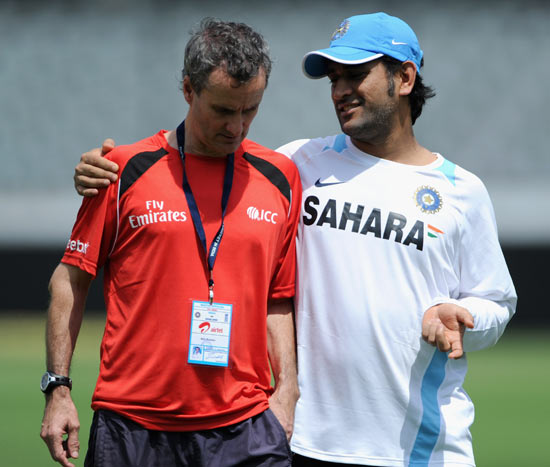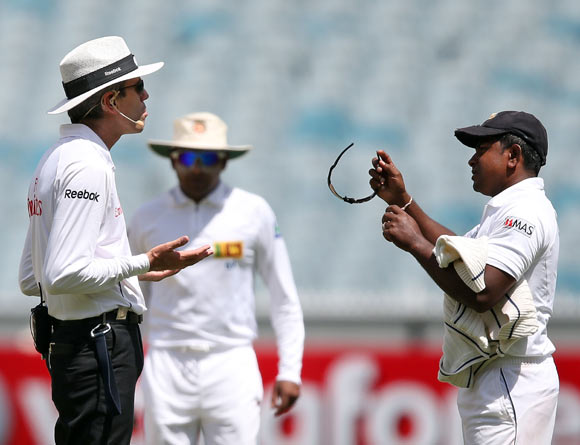Photographs: Shaun Botterill/Getty Images
Former International Cricket Council elite panel umpire Simon Taufel believes decision-making in modern-day cricket has become tougher because the extensive use of high-end technology and reviews put more "pressure" on the on-field officials.
- Does DRS need improvement?
Taufel also discussed the benefits of the decision review system (DRS), which has come under fire during the ongoing Ashes series following a number of controversial decisions.
"Decision-making in today's game is in my opinion tougher than when I started umpiring 22 years ago because more people see evidence that we may not get to see on the ground at the time," Taufel said during the 13th MCC Spirit of Cricket Cowdrey lecture at Lord's in London, on Wednesday.
"Anyone who watches the game at the ground, on the giant replay screen or on TV, will assess each and every decision of the umpires and also make an overall judgement of their performance," he said.
"There is no doubt we now have a lot more 'armchair' experts. Today, everyone umpires the game by watching television. The invasive nature of this broadcasting has a double edge to it - it does put more pressure on players and umpires. Not too much now happens on a cricket field that is not captured by a camera, a microphone or piece of technology," he added.
Taufel not against the use of technology
Image: Umpire Simon TaufelPhotographs: Mark Kolbe/Getty Images
Taufel, however, insisted that he is not against the use of technology in the game.
"The investment by television companies in extra cameras, high-speed frame rates, computer software programs and military infra-red technology, plus high definition has certainly given the spectators a lot more information," he said.
"This has the ability to bring out the best in the game and also the worst."
Taufel, who now serves as the ICC umpire training and performance manager, became the first umpire to deliver the Cowdrey lecture.
"In today's cricket, the decision of the umpire is scrutinised by all these cameras -- slow motion, ultra motion, Hot Spot front on, Hot Spot leg side, Hot Spot off side, ball tracking and prediction, Snicko, stump audio, the mat and then by up to three commentary experts," he said.
"After all that public scrutiny and technology, there is often divided opinion about what the correct decision was," added Taufel, who retired from umpiring after the World T20 in October last year.
Umpires have to police other vital areas of the modern game, says Taufel
Image: India captain Mahendra Singh Dhoni speaks with umpire Billy BowdenPhotographs: Gareth Copley/Getty Images
He said that the role of an umpire in today's cricket is much more than just making decisions.
"We have to police (and I personally dislike this term and approach) other vital areas of the modern game. Player behaviour, ball tampering, over rates, logos and clothing, impact of ground, weather and light, having to reduce playing times," the Australian said.
Taufel though agreed that technology had its benefits as it had allowed the players and the viewers to understand the challenges faced by match officials during a game.
"One benefit of the current technology system has been the reduction in dissent charges and improvement in behaviour accordingly on the field. In the majority of cases in the modern game, if an umpire has made an error, there is an ability to correct it," he pointed out.
"In an Ashes Test, if there is an error off the first ball of the game, it can be corrected at the time rather than have it on the umpire's conscience for the rest of the day and have the players constantly remind him of it.
"If I make an error, it stays with me all day, all game and I have to keep focused and performing in the middle. There is no dressing room to immediately take refuge while another umpire comes out to the middle, no time off the field to regather thoughts and regroup," said Taufel.
'The technology genie has been let out of the bottle'
Image: Umpire Nigel Llong speaks to Sri Lanka spinner Rangana HerathPhotographs: Michael Dodge/Getty Images
Taufel, however, stressed that match officials needed to be more pragmatic about the use of technology.
"I believe the highest form of the game needs to have the highest standards of respect, spirit of cricket, behaviour and integrity - those at the highest level are setting the tone and standards for others to follow, be they players, umpires or administrators. We owe the future of our game that much," he said.
"The technology genie has been let out of the bottle and it's not going to go back in. I would simply advocate that we look at ways to be as pragmatic as possible so we can get more correct decisions and deliver more justice," Taufel elaborated.
"I do have an important message on this topic though as it is often asked, 'what is your view on the DRS?' I'm not sure that this is the right question. Perhaps we should be asking 'are we using technology in the best way to serve the players, supporters, umpires and values of our game?'
"No matter what system of technology we implement in our game, it will not be perfect or 100 per cent. The all-human solution is not 100 per cent, neither is the DRS and neither will be an 'all appeals' review system. There are trade-offs and compromises with every system adopted. It all depends how the majority believe our game should be played underpinned with the values we want to promote and preserve," he concluded.





Comment
article